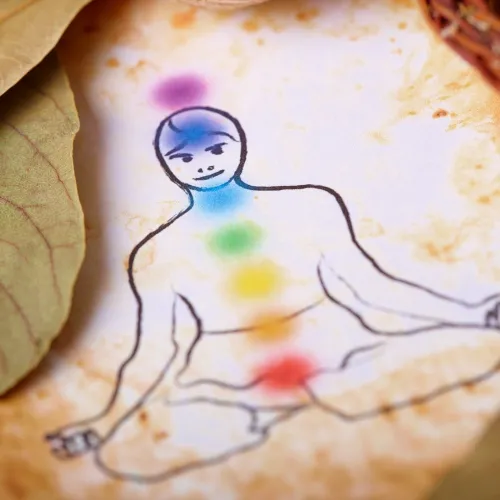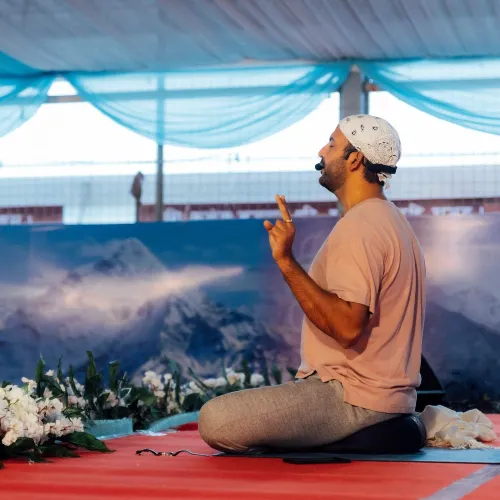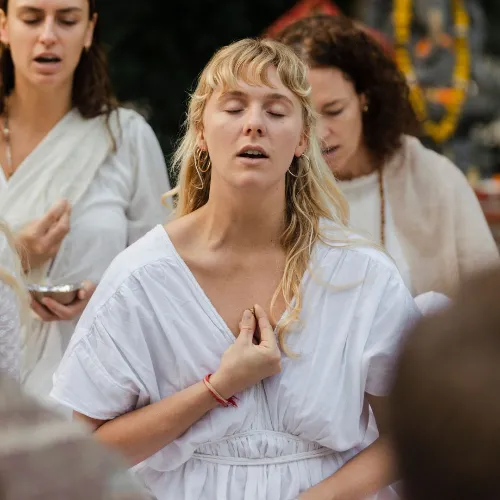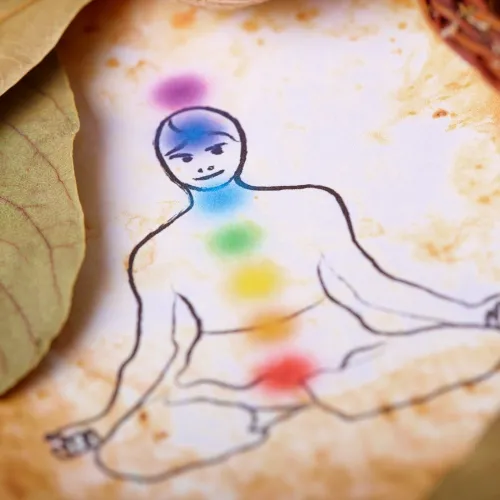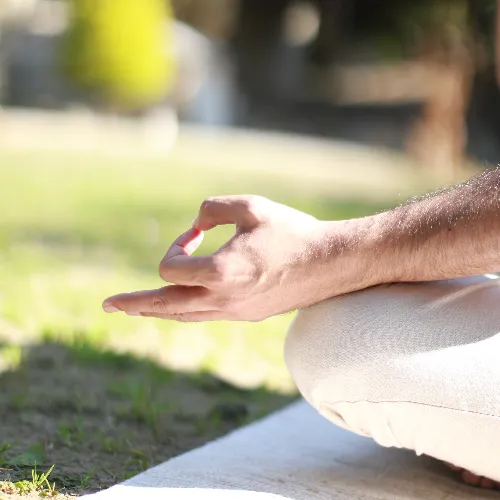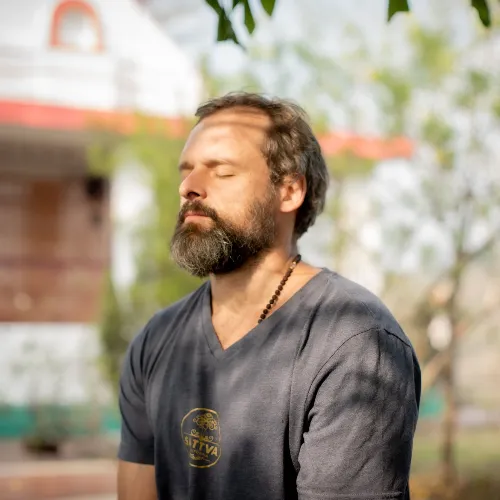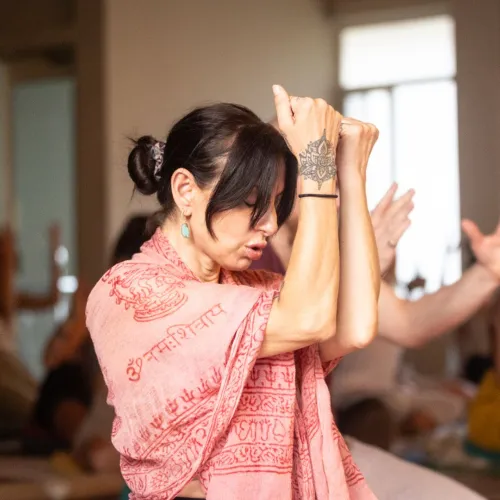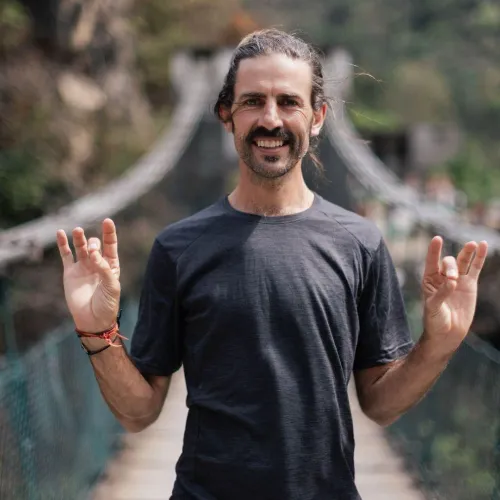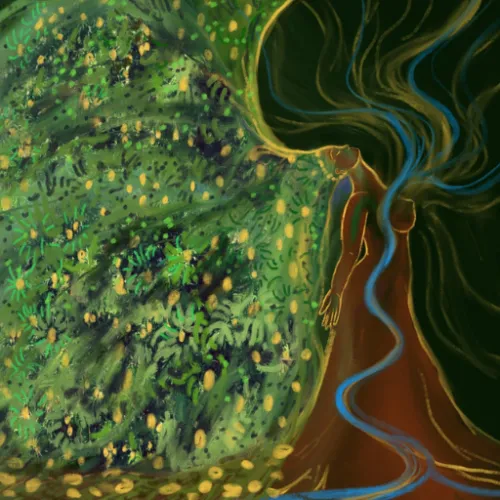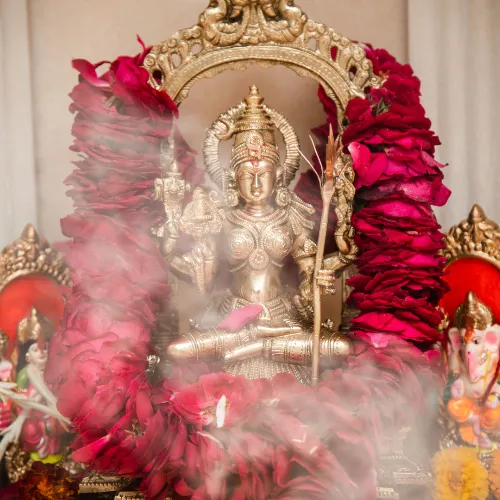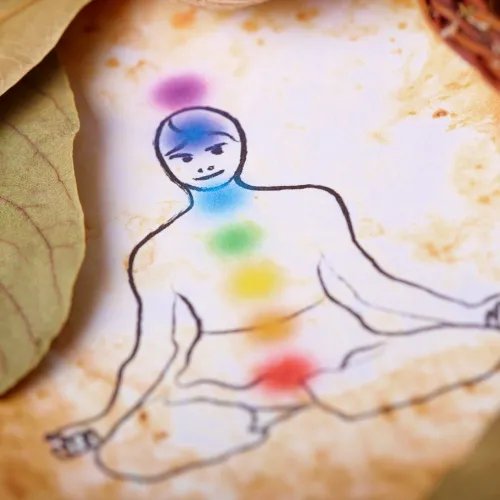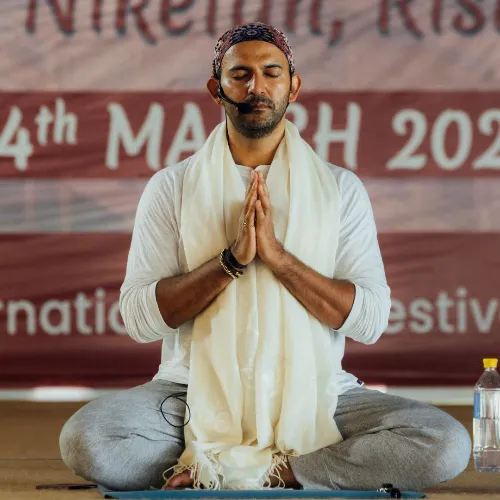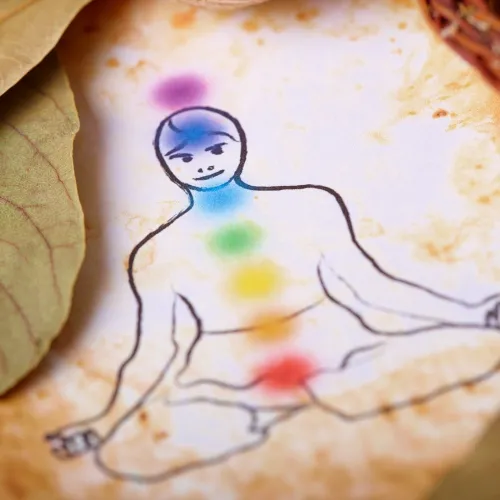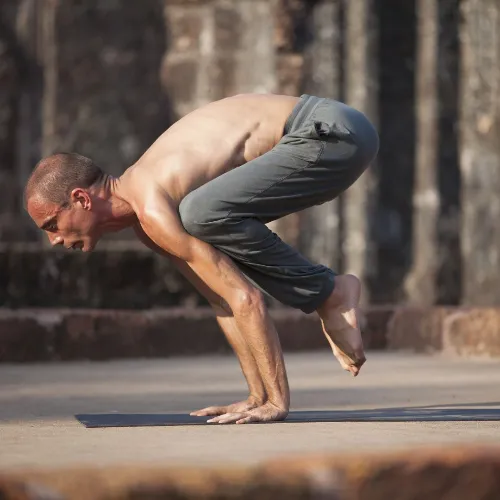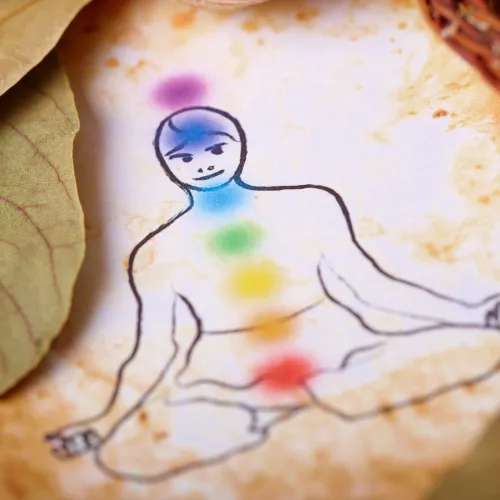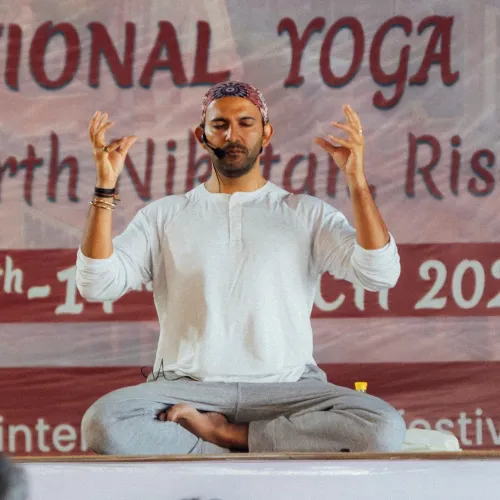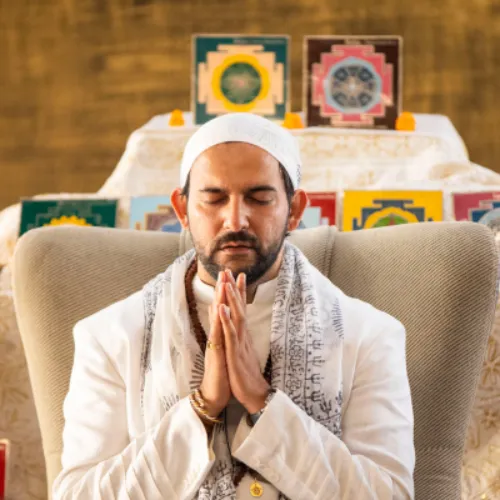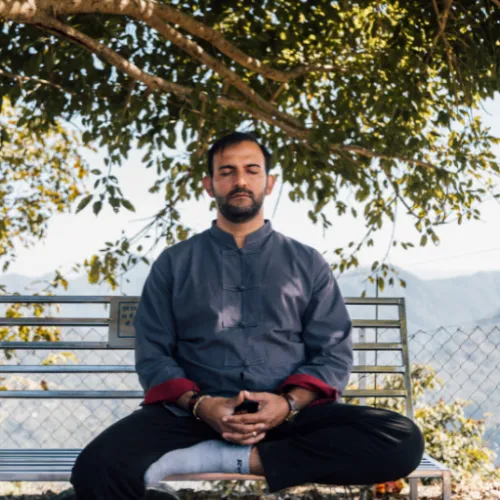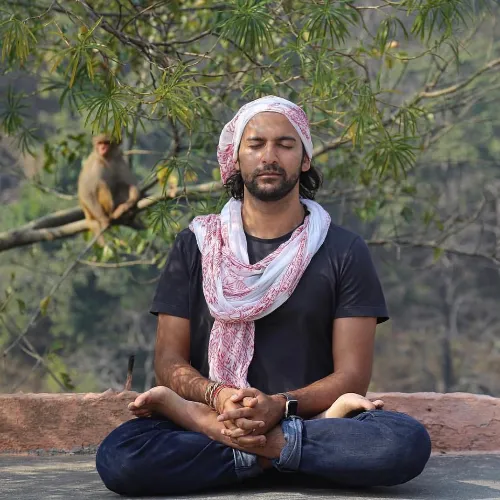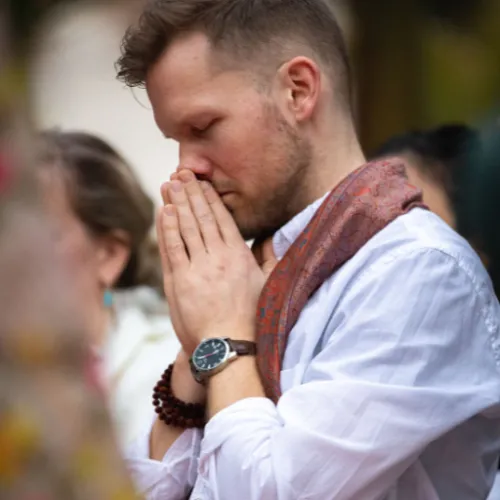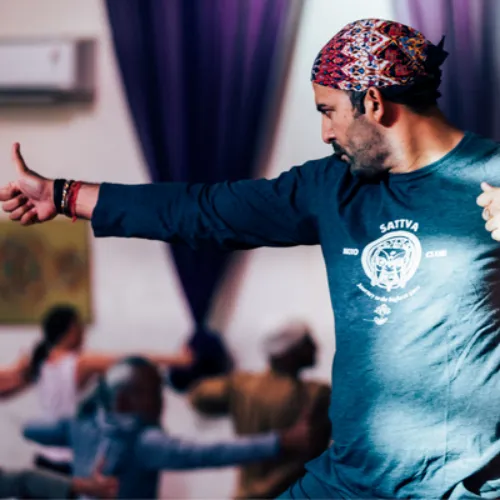

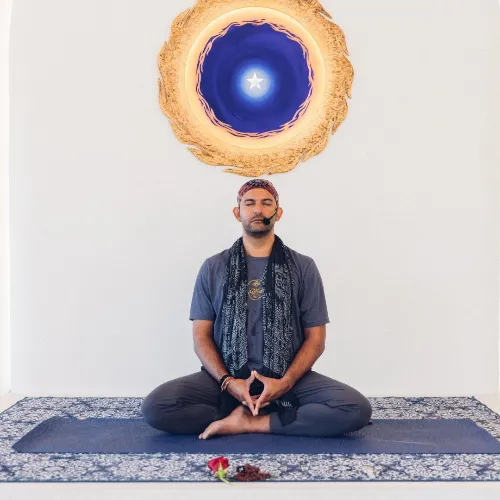
From sutras 35 to 45 of the Yoga Sutras, Patanjali explores the siddhis, or spiritual powers, that arise as one progresses in yoga, focusing on the yamas and niyamas. He highlights how our inner state shapes our experience of the world. As we evolve, our perception changes, and the universe reflects our inner experience.
2.35 Ahimsa pratishthayam tat samnidhau vaira tyagah
As one truly embodies ahimsa (non-violence), hostility and violence naturally dissolve around them. The presence of a yogi established in non-violence can spread peace to those nearby, both physically and spiritually.
We can see this in the story of Angulimala and the Buddha. When the ruthless bandit, Angulimala, approaches Buddha, instead of ferociously cutting off his finger, a window of opportunity opens up to him because Buddha is established in the state, the practice and the experience of ahimsa.
The non-violent Buddha provides the violent Angulimala with a chance to drop his violence, his trauma, the narrative he uses to justify the violence he inflicts on others and transformation becomes available to him.
It’s a wonderful example of how when within close proximity to such a Being, hostility simply drops away. In essence, when hostility exists, it means there is a disconnect in the heart. True yoga involves closing that distance and fostering a state of inner and outer peace.
2.36 Satya pratishthayam kriyafalashrayatvam
As one becomes established in satya, access is gained to the unchanging value of truth. This deeper connection allows actions and words to become powerful and effective. The results, or kriyafala, of actions then begin to manifest more fully.
However, if results don’t come immediately, it doesn’t mean one is not in satya. It’s essential to stay dynamic and not rigid. If something doesn’t work, adjust and try a different approach.
Satya brings joy and manifestation power because it aligns you with the Absolute, leading to a more abundant life. Complaints and doubts indicate a lack of alignment with satya. True abundance and bliss naturally follow as you deepen your experience of truth.
2:37 Asteyapratishthayam sarvaratnopasthanam
As you embrace the state of asteya, or non-stealing, you begin to attract abundance and prosperity naturally. Instead of chasing after success, focus on raising your own deserving power. As you align with asteya, the treasures of life, both tangible and intangible, start to reveal themselves to you.
Patanjali teaches that these "gems" are always present, but only those who are in harmony can perceive them. By cultivating asteya, you enhance your ability to recognize and enjoy these blessings.
In higher states of consciousness, this dimension of reality becomes heaven. Lack and frustration arise from ignorance and a hostile mindset but when you are established in asteya, you attract beauty and abundance, as beauty naturally draws more beauty to itself.
2:38 Brahmacharya pratishthayam viryalabhah
Virya is vitality and abhah is gain. So as one moves into brahmacharya, as one gets established in it, moves in that direction, into that state, a great vitality is experienced and one is full of energy.
Instead of energy consumption, we learn the art of transmuting energy, so great courage and vitality fills the individual. One of the siddhis is this gain, this tangible experience.
These are all tangible experiences, gems coming to us, this power of manifestation, all hostility being dropped. You go somewhere where the doors have been shut and now the doors open to you. When you are in that particular state, when you are in the state of flow, doors open for you. These are all tangible experiences Patanjali is discussing, which make life more and more charming for us.
2:39 Aparigraha sthairye janmakathanta sanbodhah
Through becoming established in aparigraha, Patanjali says, non-local knowledge starts to become available to us, knowledge about our different lifetimes becomes available to us, supreme knowledge naturally starts to come.
Now this knowledge is not just about words. Having access to non-local knowledge means that you’re having access to knowledge which is intuitive, knowledge which is very clear. It’s a certain intuition; there is no doubt, no shakiness in this knowledge. A complete, conclusive knowledge starts to arise in you that is not linear, just conclusive, a knowing. It’s like a whole knowledge downloading in you, then you discover that you know things beyond your memory.
2:40 Sauchat svanggajugupsa parairasansargah
As you practise saucha, you begin to transcend attachment to the body. A purified body feels lighter and less burdensome.
Patanjali explains that by consistently practising saucha and eliminating toxins, you move beyond seeing yourself as just a body. Instead, your body becomes a gateway to experiencing the infinite.
Every experience of the body is experienced by the supreme Being; the supreme Being enjoys itself through the body.
Contrary to some beliefs, enjoying physical experiences is not wrong; it’s part of appreciating the body as a vessel for cosmic intelligence. As you refine your body through saucha, you also refine your consciousness, allowing you to experience life more fully without attachment.
The more we refine the body, the more we are able to transcend our identity primarily as the body. As this happens, naturally the body becomes more and more filled with cosmic intelligence.
The supreme Being, the cosmic creative intelligence, acquires this whole physiology and then an experience which is being experienced through this body has a cosmic value. It explodes like a supernova effect, because the supreme Being is enjoying it now. A cosmic experience starts to occur. Naturally, craving is no longer there. One starts to develop non-attachment, vairagyam, and greater ecstasy results.
2:41 Sattvashuddhi saumanasyaikagryen driyajayatmada rshana yojnatvani cha
Patanjali then goes on to discuss the subtler value of saucha. As one goes deeper into saucha, one develops a cheerfulness.
As we start to clear away that which is no longer relevant to us and go deeper into our practice, releasing that which is not our true Self, releasing the toxicity, we start to gain the vision of sattva.
As we gain the vision of sattva within, cheerfulness starts to develop. The capacity to be in the state of cheerfulness, genuine cheerfulness, not a fake cheerfulness, starts to become available to us, this one-pointedness. The mind starts to be purified and gain greater value of the soul, greater value of the Absolute.
The mind becomes more focused, more cheerful. The senses refine and become more supportive of evolution. Then our senses are able to draw in a lot more information, but at the same time they don’t go where we don’t want them to go.
So when our senses come within the field of our soul, the cosmos starts to reveal itself to us and then we start to have access to the saumanasya, to the hidden value in every finite expression. The Self is witnessed and experienced.
2:42 Santoshad anuttamah sukhalabhah
Through santosha one experiences supreme bliss, unexcelled bliss, a bliss which cannot be topped. Without santosha there is no bliss, Patanjali says. Only through santosha can one enjoy great ecstasy, great joy.
Santosha, as discussed in sutra 32 of book 2 (That Is This), is contentment that continues to move in the direction of more. The universe is always moving in the direction of more. But if a mind is not established in the Absoluteness, then its perpetual movement in the direction of more is violent. It is filled with lack, conflict, restlessness and misery. Nothing is ever enough.
However, if a mind is established in santosha, then its movement in the direction of more is backed by bliss and gratefulness. As you go deeper and deeper into your illuminated consciousness, you naturally gain greater and greater contentment, greater and greater bliss and more and more creativity flows.
2:43 Kayendriya siddhirashuddhikshayat tapasah
Through the practice of tapas, we are able to purify the body, clear it of toxins, and so the mind becomes clear and our senses become more refined, more finely tuned, and we are able to draw more information in through them. We can then enjoy far more through our senses.
Through tapas, we start to gain a greater power not just over our body but also over our senses. Our mind clears. With a clear mind we develop strong willpower and willpower is one of our great allies.
We need to have that navel power and the way to develop navel power is through tapas. We need it on our journey through space and time. Some people think willpower is against surrender and that surrender and will are separate, but this is not the case. A surrendered will is the hallmark of the yogi. When you have total surrender to what Is, then you have strength and will, simultaneously.
2:44 Svadhyayad ishtadevata sanprayogah
Through the practice of svadhyaya, one gains greater self-awareness, greater self-realisation, and one becomes closer to Ishta. Then one is able to experience union as expressed in shape and form.
If your knowledge of yourself, your true Self, is increasing, then it is bound to happen. It has to accompany the experience of closer communion with the Divine.
A sense of sacredness becomes much more available to you as you practice svadhyaya, as you observe yourself. Then you naturally develop a greater capacity to be in tune with God, with Ishta, the Divine. It will naturally start to happen.
2:45 Samadhi siddhir ishvarapranidhanat
Patanjali says that through the practice of ishvarapranidhanat samadhi becomes much more accessible, through moving in the direction of unity, through ishvarapranidhanat.
Of course, through surrender we gain unity.
When you surrender your ego, you surrender your doubt, you surrender your complaining, you surrender everything. The value of your surrender is directly proportional to the value of your unity. The unity you experience is directly proportional to the level of surrender you have. And this surrender is the act of the strong not the weak.
Surrender involves one’s will. It is not an act of weakness, it is an act of great strength. That is why samadhi is the gift of ishvarapranidhanat.
Surrender is one of the highest expressions of love, you surrender and you experience love.
The more you love, the more you experience love; love that is free and liberating, love that is totally illuminating.
To explore the Yoga Sutras of Patanjali in a deeper way, check out This is That by Himalayan Master Yogi, Anand Mehrotra.
